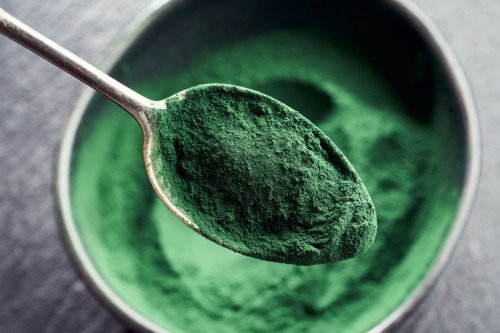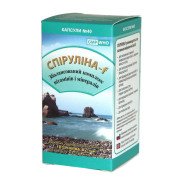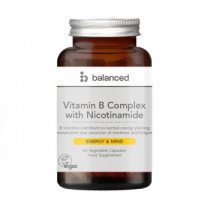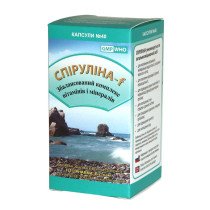
What is spirulina?
Spirulina is a blue-green algae that is often sold as a dark green powder packaged in capsules or compressed into pills.
Spirulina is a superfood that saturates the body with all the necessary nutrients, which are contained in a higher concentration than in any other plant-based product.
Spirulina as a natural vitamin and mineral complex
By the content of provitamin A (in the form of β-carotene), spirulina surpasses butter and cheese by 400 times, eggs by 1500 times, sour milk cheese and cucumbers by 2500 times.
Vitamins of group B in spirulina contain on average 40-150 times more than in dairy products, meat, eggs.
Spirulina contains 5 times more iron than dill or brewer's yeast.
Algae contains selenium and germanium - antioxidants that prevent the development of cancer, as well as a large amount of the blue pigment phycocyanin - the only known substance that can stop the growth of cancer cells.
In addition, spirulina contains a huge amount of polyunsaturated fatty acids: omega-3,-6,-9,-12, which are necessary to preserve the youth of the skin (tightness, elasticity).
Spirulina contains 18 types of amino acids, 8 of which are essential (that is, they cannot be synthesized in the human body), as well as a whole range of minerals and trace elements, including iron, iodine, calcium, magnesium, honey, zinc, phosphorus, selenium, sodium, potassium, chlorine.
Spirulina for detoxification
Spirulina is able to effectively remove toxins and radionuclides from the body, which is especially relevant in the conditions of modern civilization.
Residents of large cities and ecologically unfavorable areas, and people living or working in harmful conditions, should pay attention to spirulina and make it an element of the daily diet.
What is the benefit of spirulina?
By reducing inflammation, spirulina stimulates all body systems to work better, provides the body with nutrients and powerful antioxidants necessary for optimal performance.
Useful properties of spirulina:
- Strengthens immunity
- Sharpens mental abilities
- Helps to cleanse the skin
- Lowers cholesterol and glucose levels, lowers high blood pressure
- Strong antioxidant, anticancer effect
- Improves the condition of the skin, nails and hair
- Increases mental and physical performance
- Increases the level of hemoglobin
- Restores the body after suffered diseases
Useful properties of spirulina and research
In one study, daily consumption of 2 grams of spirulina significantly reduced bad cholesterol (LDL) and triglycerides, while increasing good cholesterol (HDL).
In a similar study, daily consumption of a gram of spirulina reduced triglycerides and LDL (bad cholesterol) by 10.1% and 13.3%, respectively.
According to research, spirulina can activate certain immune cells that fight cancer cells, especially oral cancer.
Animal studies also show that spirulina can activate natural killer cells that provide protection against tumors.
Spirulina is a valuable source of antioxidants and can counteract free radicals.
Spirulina is rich in phycocyanin, a type of antioxidant that gives spirulina its blue-green color. Research shows that phycocyanin can prevent oxidative stress, fight inflammation, and have neuroprotective effects.
There is also research on the use of spirulina in the treatment of allergic rhinitis. Consuming 2 grams daily can significantly relieve symptoms including sneezing, itching, nasal congestion, and nasal discharge.
Researchers believe that spirulina can be very effective in controlling glucose levels in diabetes.
In one study, people with type 2 diabetes were given 2 grams of spirulina every day for 2 months. By the end of the study, they recorded lower fasting and postprandial glucose levels than the placebo. This shows that spirulina can be an effective supplement to treat type 2 diabetes and prevent complications.
Research shows that 1 tablespoon of spirulina can provide up to 11 percent of your daily iron needs. When added to other iron-rich foods, spirulina can help increase iron needs to treat anemia.
How to take spirulina?
A daily dose of 5-8 grams of spirulina.
Spirulina can be taken with meals, but is best taken 20-30 minutes before meals at any time of the day.
However, if you feel the tonic effect of spirulina, it is better to drink in the first half of the day.
Spirulina can be used on a daily basis.
Harm of spirulina and contraindications:
Spirulina should be used with caution in people with autoimmune diseases.
You should also make sure that the spirulina is of good quality, as there is a risk of heavy metal contamination.
Spirulina in dietary supplements and dietary supplements:








